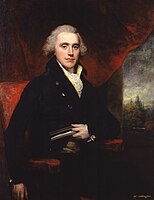Henry Addington, a member of the Tories, was appointed by King George III to lead the government of the United Kingdom of Great Britain and Ireland from 1801 to 1804 and served as an interlude between the Pitt ministries. Addington's ministry is most notable for negotiating the Treaty of Amiens, which marked a brief cessation of the Napoleonic Wars.
Addington ministry | |
|---|---|
 | |
| 1801–1804 | |
 Portrait of Henry Addington by William Beechey (1803) | |
| Date formed | 17 March 1801 |
| Date dissolved | 10 May 1804 |
| People and organisations | |
| Monarch | George III |
| Prime Minister | Henry Addington |
| Total no. of members | 11 appointments |
| Member party | Tory Party |
| Status in legislature | Majority |
| Opposition party | Whig Party |
| Opposition leaders | |
| History | |
| Elections | |
| Legislature terms | |
| Predecessor | First Pitt ministry |
| Successor | Second Pitt ministry |
Cabinet
edit| Portfolio | Minister | Took office | Left office | Party | |
|---|---|---|---|---|---|
| (head of ministry) | 17 March 1801 | 10 May 1804 | Tory | ||
| Lord Chancellor | Continued | 14 April 1801 | Independent | ||
| 14 April 1801 | Continued | Tory | |||
| Lord President of the Council | Continued | 30 July 1801 | Independent | ||
| 30 July 1801 | Continued | Tory | |||
| Lord Privy Seal | Continued | Continued | Tory | ||
| Secretary of State for the Home Department | Continued | 30 July 1801 | Tory | ||
| 30 July 1801 | 17 August 1803 | Tory | |||
| 17 August 1803 | 12 May 1804 | Tory | |||
| Secretary of State for Foreign Affairs | Continued | 14 May 1804 | Tory | ||
| Secretary of State for War and the Colonies | 17 March 1801 | 12 May 1804 | Tory | ||
| First Lord of the Admiralty | Continued | 1804 | Whig | ||
| Master-General of the Ordnance | June 1801 | Continued | Independent | ||
| President of the Board of Trade | Continued | 7 June 1804 | Independent | ||
| President of the Board of Control | May 1801 | July 1802 | Tory | ||
| July 1802 | Continued | Tory | |||
Changes
edit- May 1801 – George Legge, Lord Lewisham (from July Earl of Dartmouth) enters the Cabinet as President of the Board of Control.
- July 1801 – The William Cavendish-Bentinck, Duke of Portland succeeds John Pitt, Earl of Chatham as Lord President (Chatham remains Master of the Ordnance). Thomas Pelham, Lord Pelham of Stanmer succeeds Portland as Home Secretary.
- July 1802 – Robert Stewart,Lord Castlereagh succeeds Dartmouth at the Board of Control.
- August 1803 – Charles Philip Yorke succeeds Pelham as Home Secretary.
Notes
edit- ^ a b Fisher, David R. "The 'New Opposition', 1801–4". The History of Parliament. Retrieved 15 November 2017.
- ^ Evans 2002, p. 73.
Work cited
edit- Evans, Eric J. (2002). William Pitt the Younger. Routledge. ISBN 978-1-1347-8677-0.
Further reading
edit- Cook, Chris; Stevenson, John (1980). British Historical Facts: 1760–1830. Palgrave Macmillan UK. ISBN 978-0-3332-1512-8.